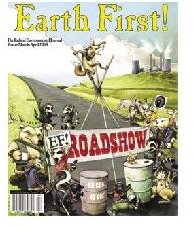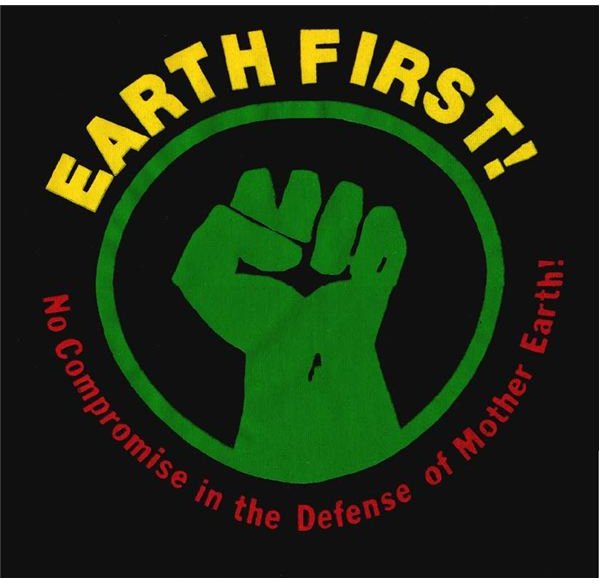What is The Earth First! Journal? Learn About Radical Environmentalism, Deep Ecology and How People Are Working to Save the Planet
New Fundamentals
In the post-Inconvenient Truth years it is a new chic to consider yourself environmentally friendly. Though it has been a high profile issue for the last two decades, now it seems as though common consumerism and lifestyle choices can be easily tailored to a new environmental attitude. The key point of this new movement, which radicals are calling “greenwashing,” is that there is no reason for a fundamental change in society because you can simply make conscious choices such as energy safe appliances and hybrid cars. In direct contrast to this Earth First! has been one of the main voices coming out and saying not only is this new green corporatism a new way for the same companies to market to a developing demographic but it is also further hurting the true movement toward environmentalism.
No Compromise
The Earth First! Journal is the seasoned publication giving circulation to a more radical voice in environmentalism. The movement itself hit the activist scene at the end of the seventies as a response the constant compromise of environmentalists at the time. Dave Forman, later author of Confessions of an Eco-Warrior, felt inspired by direct action movements of recent years such as the Black Panthers and American Indian Movement and decided to put this into action. This “no compromise” treaty was born, where an absolute commitment to environmental preservation was given over making consolidations in respect to nature. Instead of considering the environment as one of the elements that should be part of the utility calculation it was seen that environmental well being should be the first place that people protect. With this perspective at its heart, the movement developed over the last several decades, picking up other radical influences and deep ecological perspectives that go beyond simple green home solutions.
The Organization
Today Earth First! collectives appear spontaneously, often in response to a local issue. During the destruction of the northern California redwoods of the late 1980s many environmental groups and activists joined together under the banner for hundreds of protests, sit-ins, and underground direct action. The salvage logging brigade in the Warner Creek area of Oregon in 1995 led Cascadia Earth First! to solidify and create a road blockade that evolved from a protest to an influential temporary society. Though some Earth First! chapters remain consistently active as an organization, the main connection they hold is through the Earth First! Journal. Titled as the “Journal of Radical Environmentalism,” the publication has become the standard for those who want to go far beyond common environmental consciousness.
Deep Ecology
The publication, and the movement in its current incarnation, is based around the philosophy of deep ecology. The premise of this ecological interpretation is the equality between all species and a need for egalitarian balance. Instead of using the products of the earth and animals for its utility the belief is that all things must exist for their own sake. Conventional conservation and sustainability ideas work around the idea of maximizing the earth and its accessories as things that should be preserved only for further human consumption. Deep ecology proposes that animals should be considered equal to humans, that the earth should not be entered into a bourgoise neo-liberal “cost benefit analysis,” and that all further political considerations must be done in a way to eliminate any kind of oppressive or tyrannical elements.
Primary Information
Since the radical environmental movement is built on a few foundations, the journal, and its accompanying website, provides primers on a few basic functions. It is here where they lay down the philosophy of direct action, which proposes that instead of trying to inspire legislative or representative action activists should actually stop the desired behavior themselves. This idea runs all the way from conventional protesting, to non-violent civil disobedience, to what is commonly called Monkeywrenching. Monkeywrenching, a phrase taken from the seminal environmental novel The Monkey Wrench Gang, refers to the destruction of equipment used in logging or other environmentally degrading industries. The Earth First! Journal is careful about its language for legal considerations, but they include a primary on this as well and have openly discussed things like the dismantling of logging trucks and the use of metal spikes to destroy logging equipment.
From the Front Lines
The journal’s mainstay is bringing environmental activist news to the general public. Even on the most socially progressive news organization

will not give you information on extended environmental campaigns in this kind of detail. In this way it is an organizing tool where people can learn about serious activist issues, and ways they can get involved or support what may be going on under their radar. The magazine has a collective sensibility, and often changes editors quickly. The direction of the magazine is usually made by the consensus of those publishing it at the time, so the exact socio-political stances of the magazine change with those behind the press. These views have ranged dramatically, from free-market republicans to a newer trend of green anarcho-primitivists. No matter what the political message, the main goal is an absolute preservation of nature against fashionable consumption.
The Next Step
No matter what your feeling is about the necessity of the environment, Earth First! provides a side to the argument that attempts to shift environmental awareness dramatically. The journal itself is a valuable tool for all environmental activists who can reference it to learn about a whole planet of activism, how to contact prisoners who have been arrested in relation to protest, and how they can really make a statement against corporate and government entities that profit off the destruction of the natural earth.
